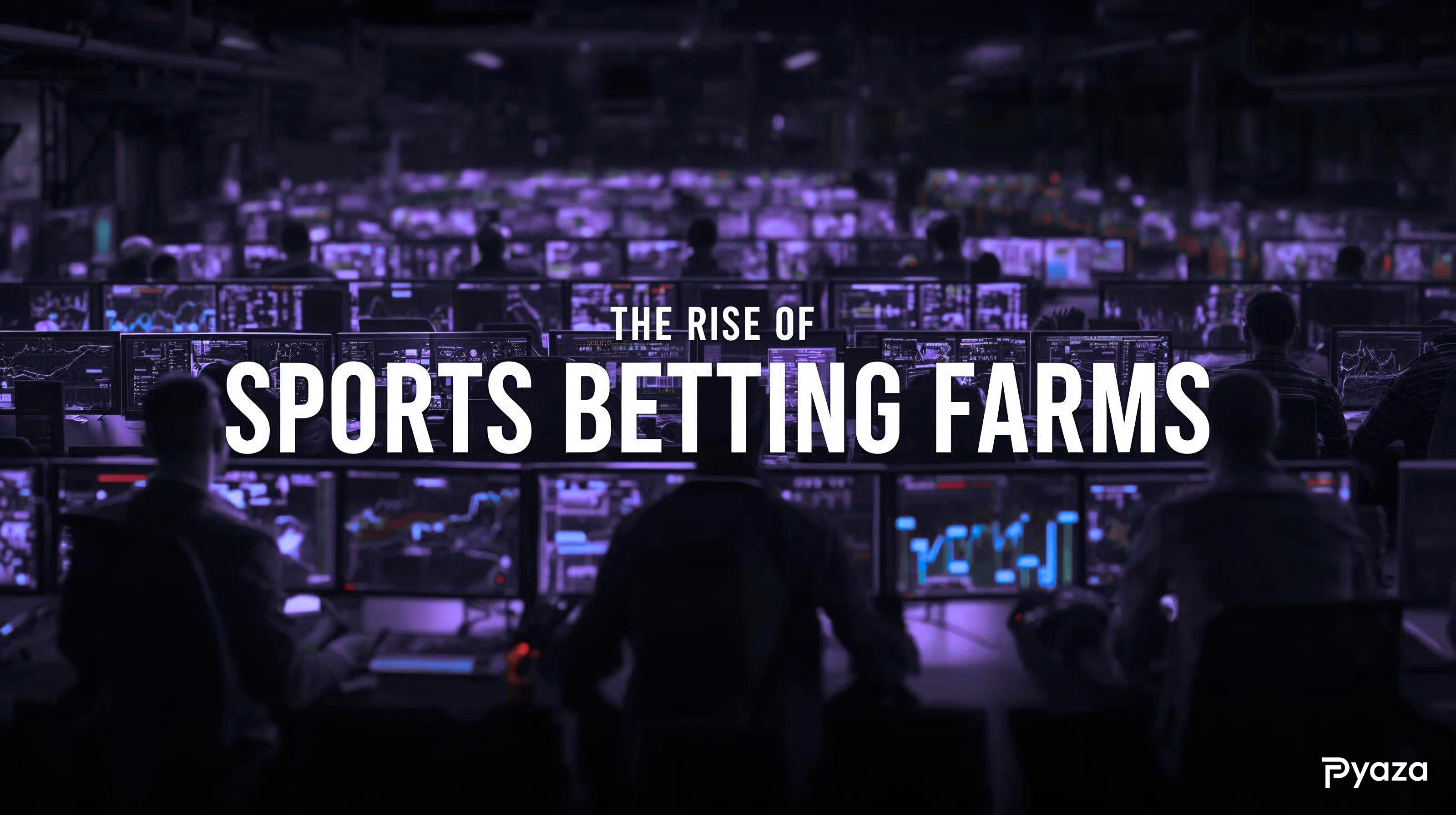The Rise of Sports Betting Farms
When Amateur Matches Become Betting Machines
)
Miguel Spiteri
Marketing Manager - Pyaza
Introduction
The Birth of Betting Farms, Thanks to COVID
Remember the eerie desert of sports in early 2020? With leagues shut down globally, two things surged: boredom and creative betting loopholes. Enter amateur “micro-leagues” that barely looked like real matches, streamed nonstop on platforms like 1xBet. From backyard cricket to futsal in curtained gyms.
What Are Betting Farms, Anyway?
Bellingcat’s investigation (with Josimar) lifted the curtain on these operations. Picture curtained gyms, drab futsal courts, and kids as young as 14 repeating match after match all day, every day. One streamer estimated nearly 1,300 amateur football games streamed in 24 hours. That is almost half a million per year, compared to just over a thousand in top professional leagues combined.
Players frequently switch teams mid-stream. “Barcelona” becomes “Manchester City” in another room. One participant confessed to being paid just a small amount of money to show up and play, one shift after another.

The Big Names Behind the Farce
Despite being banned in places like Russia and Ukraine, 1xBet continues streaming these “staged” games from hidden venues in Eastern Europe including Russia, Belarus, Ukraine, and even India. Geolocation sleuths pinpointed dozens of venues: a children’s school in Bryansk, warehouse cricket in Yaroslavl, makeshift futsal pitches in Moscow gyms, and tiny basketball courts in Belarus.
Here is the twist: 1xBet also signed sponsorship deals with big clubs like FC Barcelona and Paris Saint-Germain, which gave massive legitimacy to its shady operations.
Betting Farms and the Human Cost
These betting farms operate at an industrial scale, streaming thousands of games daily, all year round. What might look like casual matches are in reality a nonstop production line designed for betting markets. The players are often underpaid amateurs, and in some cases even minors, working exhausting shifts to keep the stream running and the odds ticking.
One former player revealed that while they were told not to deliberately “fix” outcomes, they were also instructed to keep scores within certain limits, such as not going beyond five goals in a game. This points to a controlled environment where the matches may not be fixed outright, but are heavily staged to create a steady flow of bettable content.
Another telling detail is the atmosphere itself. Unlike genuine sports, where victories are celebrated, in these betting farms there is little joy. Goals are scored, whistles blow, and then it is on to the next match. Winners rarely celebrate, because for the participants this is no longer sport - it is a job, one shift after another.
And it is not just 1xBet. Experts believe similar operations may exist beyond 1xBet, though verified cases are limited, feeding an audience that craves constant action. As the demand for betting content keeps growing, these shadow networks keep expanding, finding new ways to fill every gap in the sporting calendar. The result is more games than ever before, but less and less real sport behind them.

Why Do They Do It?
The answer is customer acquisition. These strange and exotic games spark curiosity and conversation, which leads to small bets made for fun. Once a customer places those first wagers, sportsbooks expect them to move on to higher-margin products such as casino games or official sports leagues. That is where most of the profit lies.
Exact numbers are difficult to pin down, since unlicensed gambling thrives in the shadows. What is clear is that the illegal online gambling market remains massive worldwide. In regulated countries like the United States, legal sportsbooks generated nearly $150 billion in wagers and $13.7 billion in revenue in 2024, yet industry analysts believe the unregulated market is still larger on a global scale. Micro-leagues and betting farms may play a role in feeding that demand, offering constant streams of action that licensed operators rarely provide.
Final Thoughts: Can It Be Stopped?
Can it be stopped? Regulations struggle to keep up. 1xBet uses a web of operations across jurisdictions and cryptocurrencies to hide in legal gray zones. Shutting down these betting farms is not as simple as issuing takedown notices.
Should it be stopped? Absolutely. Betting farms exploit the vulnerable. Players get minimal compensation, minors are involved, and transparency is nonexistent. This is a far cry from the true spirit of sport.
What is next? Technology will likely bring even stranger forms of betting content. Experiments with AI-generated simulations, automated matches, or gamified “celebrity” replays are already being discussed in the wider gambling industry. Unless regulators coordinate internationally and address the demand side of the problem, these shadow networks will continue to expand.
Download the Pyaza APP to follow our coverage, connect with the team, and get involved in upcoming creator campaigns.